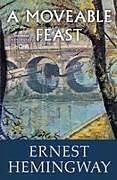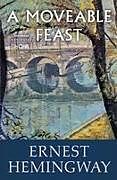A Moveable Feast
Einband:
Kartonierter Einband
EAN:
9780684824994
Untertitel:
Englisch
Genre:
Romane & Erzählungen
Autor:
Hemingway Ernest
Herausgeber:
TOUCHSTONE PR
Auflage:
Touchstone ed
Anzahl Seiten:
211
Erscheinungsdatum:
29.05.1996
ISBN:
978-0-684-82499-4
Informationen zum Autor Ernest Hemingway did more to influence the style of English prose than any other writer of his time. Publication of The Sun Also Rises and A Farewell to Arms immediately established him as one of the greatest literary lights of the 20th century. His classic novella The Old Man and the Sea won the Pulitzer Prize in 1953. Hemingway was awarded the Nobel Prize for Literature in 1954. He died in 1961. Klappentext This vibrant portrait of Paris in the 1920s, published posthumously in 1964, is vintage Hemingway--evocative, self-mocking and frank. In an extraordinary chronicle of the sights, sounds, and tastes of Paris in a bygone era, Hemingway offers readers a view of his life and the people that populated his expatriate world--Gertrude Stein, F. Scott Fitzgerald, Ezra Pound and other literary luminaries. Chapter One Then there was the bad weather. It would come in one day when the fall was over. We would have to shut the windows in the night against the rain and the cold wind would strip the leaves from the trees in the Place Contrescarpe. The leaves lay sodden in the rain and the wind drove the rain against the big green autobus at the terminal and the Café des Amateurs was crowded and the windows misted over from the heat and the smoke inside. It was a sad, evilly run café where the drunkards of the quarter crowded together and I kept away from it because of the smell of dirty bodies and the sour smell of drunkenness. The men and women who frequented the Amateurs stayed drunk all of the time, or all of the time they could afford it, mostly on wine which they bought by the half-liter or liter. Many strangely named apéritifs were advertised, but few people could afford them except as a foundation to build their wine drunks on. The women drunkards were called poivrottes which meant female rummies. The Café des Amateurs was the cesspool of the rue Mouffetard, that wonderful narrow crowded market street which led into the Place Contrescarpe. The squat toilets of the old apartment houses, one by the side of the stairs on each floor with the two cleated cement shoe-shaped elevations on each side of the aperture so a locataire would not slip, emptied into cesspools which were emptied by pumping into horse-drawn tank wagons at night. In the summer time, with all windows open, we would hear the pumping and the odor was very strong. The tank wagons were painted brown and saffron color and in the moonlight when they worked the rue Cardinal Lemoine their wheeled, horse-drawn cylinders looked like Braque paintings. No one emptied the Café des Amateurs though, and its yellowed poster stating the terms and penalties of the law against public drunkenness was as flyblown and disregarded as its clients were constant and ill-smelling. All of the sadness of the city came suddenly with the first cold rains of winter, and there were no more tops to the high white houses as you walked but only the wet blackness of the street and the closed doors of the small shops, the herb sellers, the stationery and the newspaper shops, the midwife -- second class -- and the hotel where Verlaine had died where I had a room on the top floor where I worked. It was either six or eight flights up to the top floor and it was very cold and I knew how much it would cost for a bundle of small twigs, three wire-wrapped packets of short, half-pencil length pieces of split pine to catch fire from the twigs, and then the bundle of half-dried lengths of hard wood that I must buy to make a fire that would warm the room. So I went to the far side of the street to look up at the roof in the rain and see if any chimneys were going, and how the smoke blew. There was no smoke and I thought about how the chimney would be cold and might not draw and of the room possibly filling with smoke, and the fuel wasted, and the money gone with it, and I walked on in the rain. ...
Autorentext
Ernest Hemingway did more to change the style of English prose than any other writer of his time. Publication of The Sun Also Rises and A Farewell to Arms immediately established Hemingway as one of the greatest literary lights of the twentieth century. His classic novel The Old Man and the Sea won the Pulitzer Prize in 1953. Hemingway was awarded the Nobel Prize for Literature in 1954. His life and accomplishments are explored in-depth in the PBS documentary film from Ken Burns and Lynn Novick, Hemingway. Known for his larger-than-life personality and his passions for bullfighting, fishing, and big-game hunting, he died in Ketchum, Idaho on July 2, 1961.
Klappentext
This vibrant portrait of Paris in the 1920s, published posthumously in 1964, is vintage Hemingway--evocative, self-mocking and frank. In an extraordinary chronicle of the sights, sounds, and tastes of Paris in a bygone era, Hemingway offers readers a view of his life and the people that populated his expatriate world--Gertrude Stein, F. Scott Fitzgerald, Ezra Pound and other literary luminaries.
Zusammenfassung
“There is never any ending to Paris and the memory of each person who has lived in it differs from that of any other.” —Ernest Hemingway, A Moveable Feast
Ernest Hemingway’s classic memoir of Paris in the 1920s remains one of his most beloved works. Filled with tender memories of his first wife Hadley and their son Jack; irreverent portraits of literary luminaries such as F. Scott Fitzgerald and Gertrude Stein; and insightful recollections of his own early experiments with his craft, A Moveable Feast brilliantly evokes the exuberant mood of Paris after World War I and the youthful spirit, unbridled creativity, and unquenchable enthusiasm that Hemingway himself epitomized. It is an elegy to a remarkable group of expatriates and a testament to the risks and rewards of the writerly life.
Leseprobe
Chapter One
Then there was the bad weather. It would come in one day when the fall was over. We would have to shut the windows in the night against the rain and the cold wind would strip the leaves from the trees in the Place Contrescarpe. The leaves lay sodden in the rain and the wind drove the rain against the big green autobus at the terminal and the Café des Amateurs was crowded and the windows misted over from the heat and the smoke inside. It was a sad, evilly run café where the drunkards of the quarter crowded together and I kept away from it because of the smell of dirty bodies and the sour smell of drunkenness. The men and women who frequented the Amateurs stayed drunk all of the time, or all of the time they could afford it, mostly on wine which they bought by the half-liter or liter. Many strangely named apéritifs were advertised, but few people could afford them except as a foundation to build their wine drunks on. The women drunkards were called poivrottes which meant female rummies.
The Café des Amateurs was the cesspool of the rue Mouffetard, that wonderful narrow crowded market street which led into the Place Contrescarpe. The squat toilets of the old apartment houses, one by the side of the stairs on each floor with the two cleated cement shoe-shaped elevations on each side of the aperture so a locataire would not slip, emptied into cesspools which were emptied by pumping into horse-drawn tank wagons at night. In the summer time, with all windows open, we would hear the pumping and the odor was very strong. The tank wagons were painted brown and saffron color and in the moonlight when they worked the rue Cardinal Lemoine their wheeled, horse-drawn cylinders looked like Braque paintings. No one emptied the Café des Amateurs though, and its yellowed poster stating the terms and penalties of the law against public drunkenness was as flyblown and disregarded as its clients were const…

Leider konnten wir für diesen Artikel keine Preise ermitteln ...
billigbuch.ch sucht jetzt für Sie die besten Angebote ...
Die aktuellen Verkaufspreise von 6 Onlineshops werden in Realtime abgefragt.
Sie können das gewünschte Produkt anschliessend direkt beim Anbieter Ihrer Wahl bestellen.
Loading...
Die aktuellen Verkaufspreise von 6 Onlineshops werden in Realtime abgefragt.
Sie können das gewünschte Produkt anschliessend direkt beim Anbieter Ihrer Wahl bestellen.
| # | Onlineshop | Preis CHF | Versand CHF | Total CHF | ||
|---|---|---|---|---|---|---|
| 1 | Seller | 0.00 | 0.00 | 0.00 |
